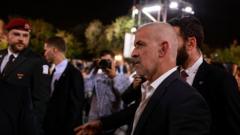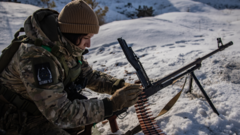Reservists and former officials urge Prime Minister Netanyahu to prioritize peace negotiations over ongoing warfare.
**Israeli Military Reserves Forge A Growing Resistance Against Gaza Conflict**

**Israeli Military Reserves Forge A Growing Resistance Against Gaza Conflict**
Military personnel call for a shift in strategy as hostages remain in peril.
In Israel, the Gaza war endures, but dissent within the military ranks intensifies. Thousands of Israeli reservists from various military branches are rallying together, signing letters urging Prime Minister Benjamin Netanyahu's government to halt the conflict and focus on negotiating a return for the 59 hostages held by Hamas. Initially, the war was supported as a means to defeat Hamas and recover captured citizens. However, optimism following an earlier ceasefire has been overshadowed by renewed hostilities, leading many, including former Mossad chief Danny Yatom, to deem the ongoing war detrimental to Israel's future.
“We realized that Israel is heading toward a very troubling direction,” Yatom stated, highlighting concerns that Netanyahu’s focus is misaligned with the public interest, placing governmental stability over the urgent need to secure the hostages’ release. The first petition, initiated by 1,000 air force reservists in early April, expressed skepticism about the war achieving its goals, cautioning that continued fighting would jeopardize the lives of hostages still believed to be alive.
As signatures on protest letters from reservists across military divisions surpass 12,000, attendance rates for reserve duty have reportedly plummeted, indicating a troubling trend. Conversations with infantry reservists, like an individual named Yoav, reveal a profound disillusionment with the conflict's current trajectory, where the perception of doing good has transformed into concern for national integrity.
Polling data suggests a significant pivot in public sentiment towards advocating for a ceasefire and prioritizing hostage negotiations. Recent protests in Tel Aviv have seen emotional displays demanding compassion for both Israeli hostages and Palestinian victims. Despite police attempts to suppress the portrayal of casualties, protests continue to challenge the government's narrative.
While dissent among military personnel swells, Netanyahu remains resolute in his position that continued military action against Hamas is paramount for hostage recovery. Yet, growing calls from within the ranks suggest a pivotal moment is on the horizon, potentially reshaping Israel's course in the ongoing conflict.
“We realized that Israel is heading toward a very troubling direction,” Yatom stated, highlighting concerns that Netanyahu’s focus is misaligned with the public interest, placing governmental stability over the urgent need to secure the hostages’ release. The first petition, initiated by 1,000 air force reservists in early April, expressed skepticism about the war achieving its goals, cautioning that continued fighting would jeopardize the lives of hostages still believed to be alive.
As signatures on protest letters from reservists across military divisions surpass 12,000, attendance rates for reserve duty have reportedly plummeted, indicating a troubling trend. Conversations with infantry reservists, like an individual named Yoav, reveal a profound disillusionment with the conflict's current trajectory, where the perception of doing good has transformed into concern for national integrity.
Polling data suggests a significant pivot in public sentiment towards advocating for a ceasefire and prioritizing hostage negotiations. Recent protests in Tel Aviv have seen emotional displays demanding compassion for both Israeli hostages and Palestinian victims. Despite police attempts to suppress the portrayal of casualties, protests continue to challenge the government's narrative.
While dissent among military personnel swells, Netanyahu remains resolute in his position that continued military action against Hamas is paramount for hostage recovery. Yet, growing calls from within the ranks suggest a pivotal moment is on the horizon, potentially reshaping Israel's course in the ongoing conflict.



















